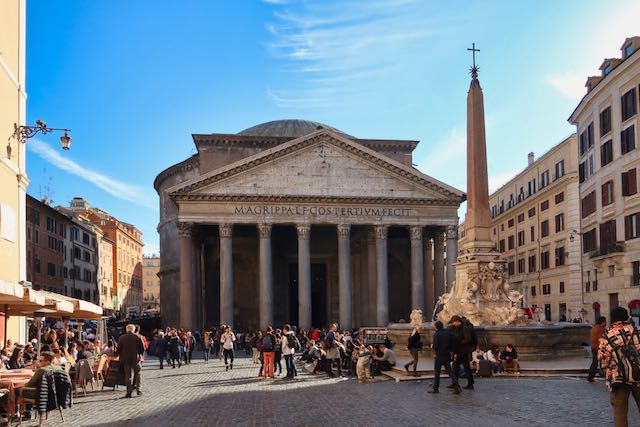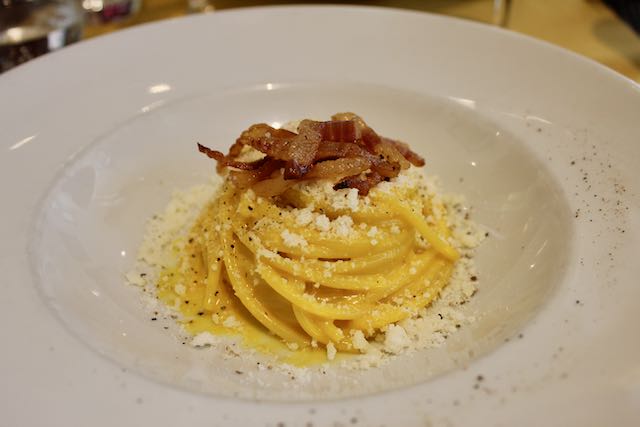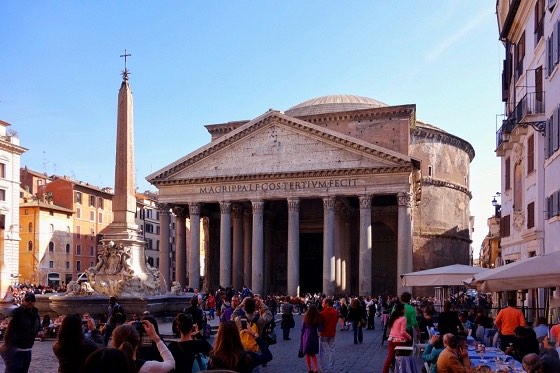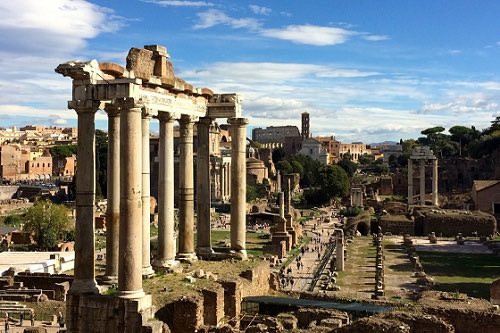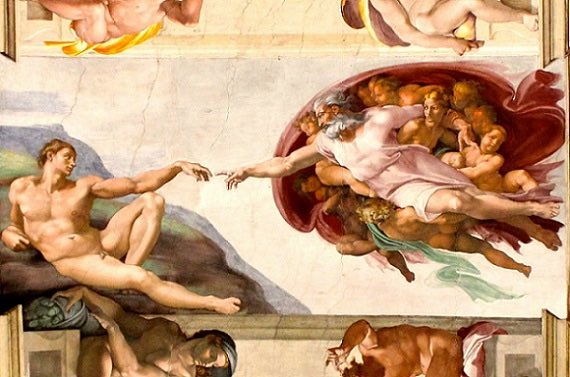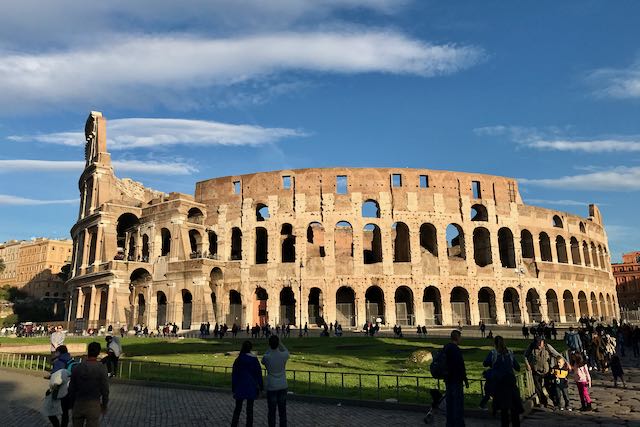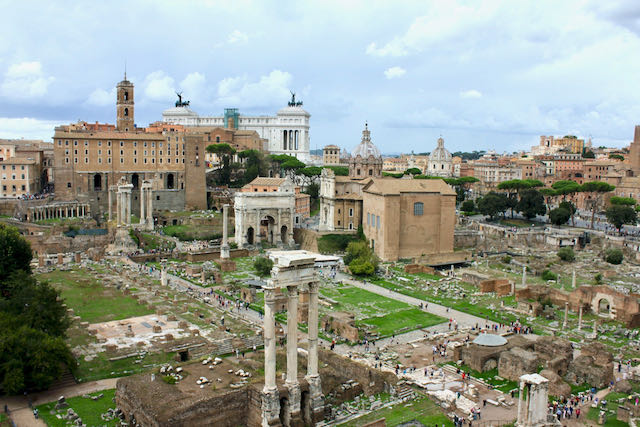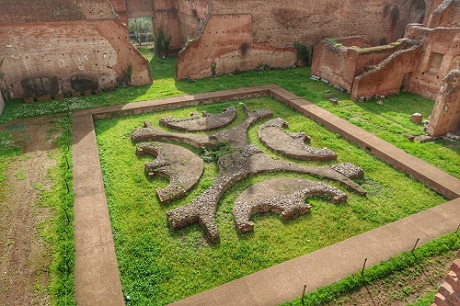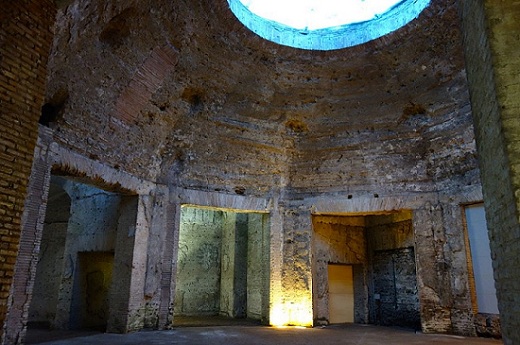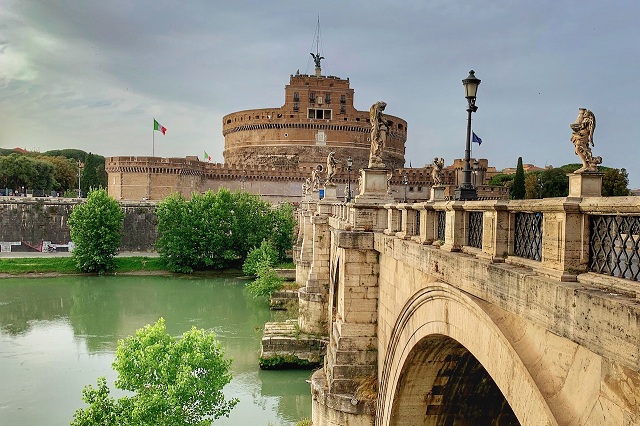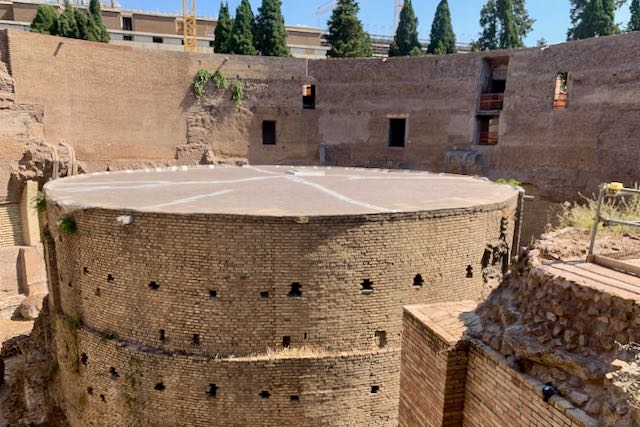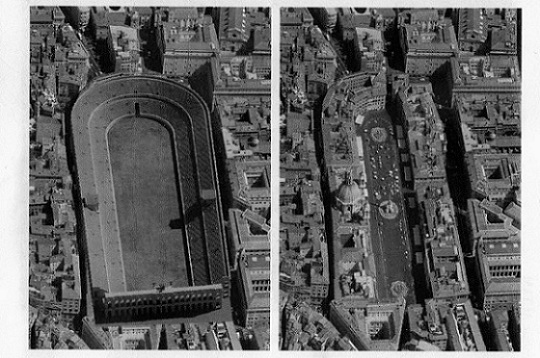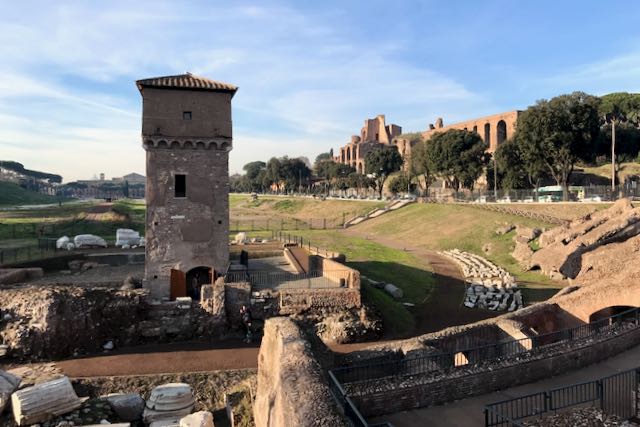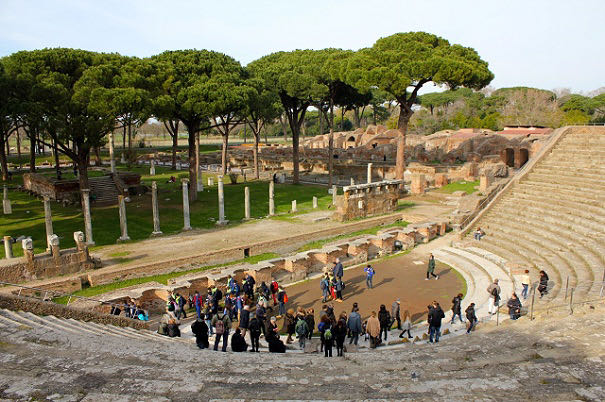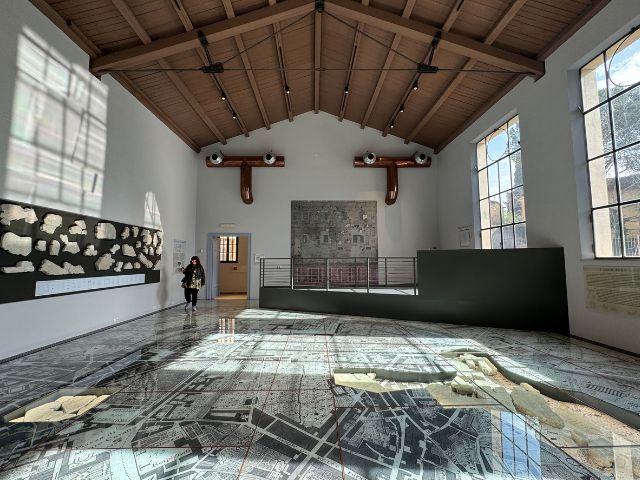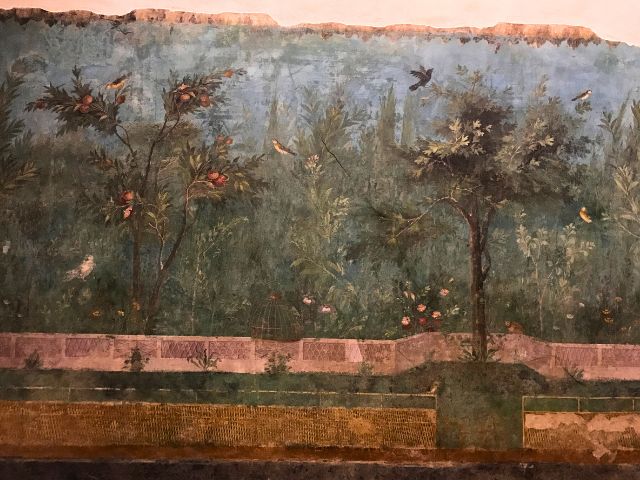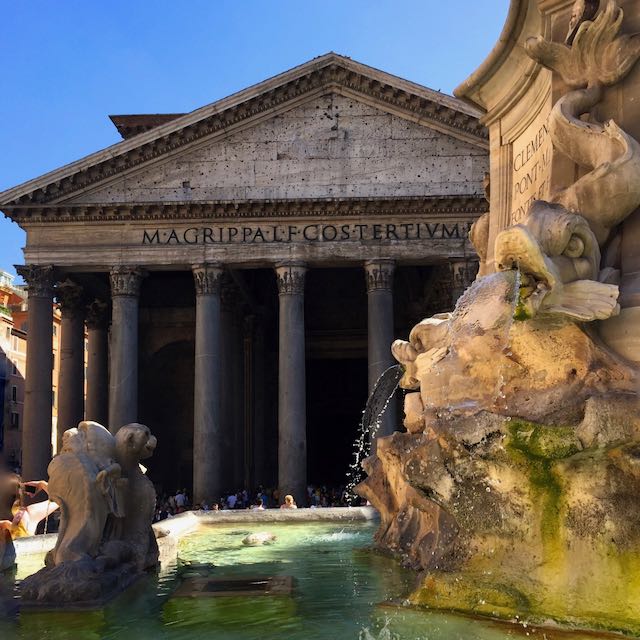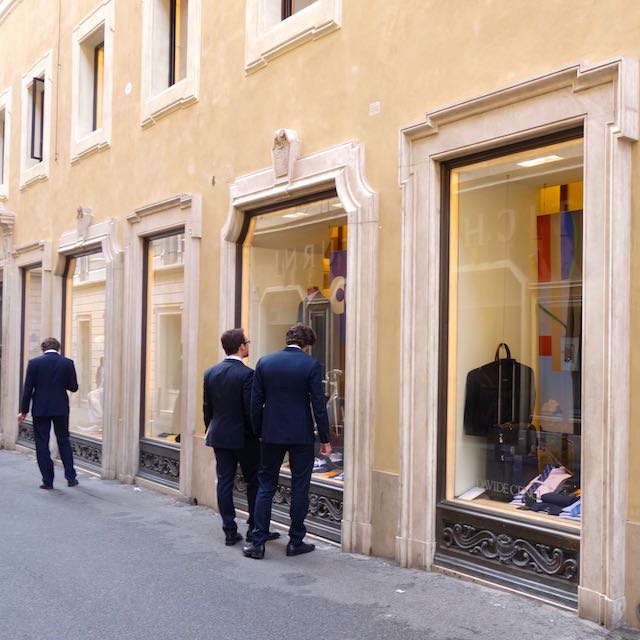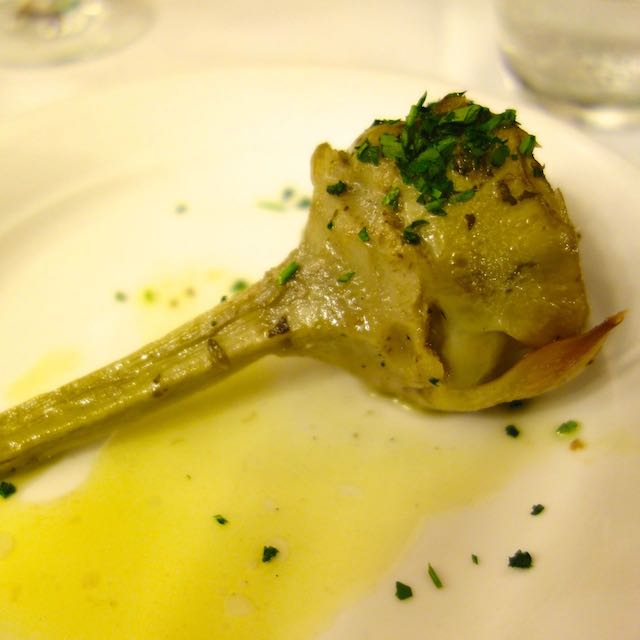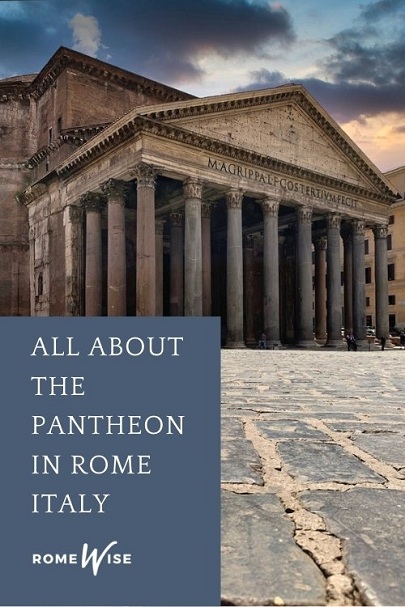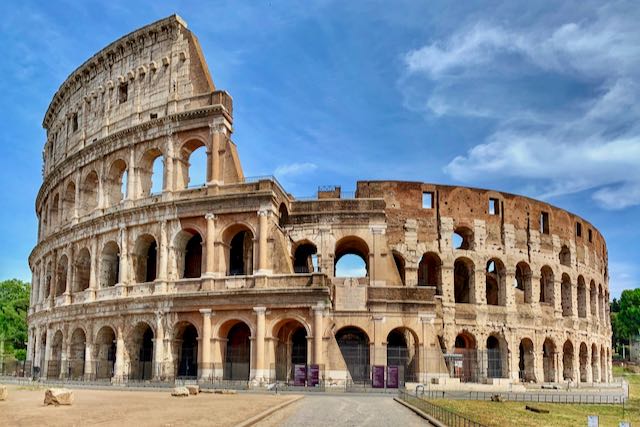- Sign up & get a FREE ebook Subscribe NOW!
- Romewise Home Page
- Rome Tourist Attractions
- Rome Italy Pantheon
Rome Italy Pantheon - Everything you need to know
When you come upon the Rome Italy pantheon for the first time, it will stop you in your tracks.
It does this to me every time I see it, and I live here!
I hope you enjoy my photos of the Pantheon here, but nothing can do it justice like seeing it in person.
All about the Pantheon in Rome
There is a lot to know about the Pantheon in Rome.
The history, the architecture, the outside, the inside, the art, what to see, do, eat nearby.
On this page, you'll find an overview of the these topics, with more details on dedicated pages if you want to learn more.
- What is the Pantheon?
- Where is the Pantheon in Rome?
- What is special about the Pantheon?
- Who built the Pantheon and when?
- What was the Pantheon used for in Ancient Rome?
- Is the Rome Pantheon still in use today?
- How can you visit the Pantheon and how much does it cost?
What is the Pantheon?
The Pantheon is one of the most well-preserved buildings of Ancient Rome.
The word "pantheon" comes from the Greek πάνθεον which literally means "a temple for all the gods", from πᾶν or pan, meaning "all" and θεός or theos, meaning "god."
So it was once a pagan temple in Ancient Rome.
Today it is a Catholic church and also a monument you can visit.
It is considered to be the forerunner for all modern places of worship.
Where in Rome is the Pantheon located?
The Pantheon is right in the center of Rome, just between the via del Corso and Piazza Navona on Piazza della Rotonda, very close to the Campo de Fiori neighborhood.
It's in the Rome rione (neighborhood) called Campo Marzio, which means "Field of Mars."
A heavenly spot
According to Roman legend, the exact location it was built on is the place where the founder of Rome, Romulus, was seized by an eagle when he died, and carried away into the skies with the gods.
You can easily fit a visit to the Pantheon into a stroll around the historic center of Rome, even if you have limited time.
Click here to see the pantheon's location in Rome on Google maps.
It will open in a separate window.
✨ Experience all of Rome's Magic in a Day ✨
What's so special about the Pantheon in Rome?
The Pantheon is truly a wonder of Roman architecture.
Here are just a few quick facts about the Pantheon that make it one of the most special monuments in Rome:
The Pantheon's dome is exactly as high as it is wide
The Pantheon's dome is about 141 feet; or 43.2 m high and wide.
If completed, it would be a perfect sphere.
The dome itself was meant to represent the vault of heaven.
Find places to stay near the Pantheon and take a look at some of our suggested accommodation here.
The construction is brilliant and stands the test of time
The Romans did a really incredible job constructing this … how do you make a dome with concrete bricks so that it does not collapse?
The answer is, you don’t.
As the layers of concrete blocks go up higher and higher, they get lighter and lighter.
At the very top, the bricks are made of pumice, a volcanic stone that is extra light.
The result is a dome that can literally stand the test of time.
Vespa tour with sidecar!
On this super-fun Vespa sidecar tour, you'll buzz around Rome and see many of the must-see monuments and sites, including the Pantheon (from the outside.)
Start the tour with a typical Roman breakfast of cappuccino + cornetto (pastry), and then sit back in your sidecar while your driver takes you around the best spots in Rome's historic center.
the Roman Pantheon has the world’s largest unreinforced concrete dome
Even Saint Peter's dome is not as large as the Pantheon's dome.
The Pantheon is the largest dome in Rome, and to this day, it's the world's largest unreinforced concrete dome.
The oculus (hole) in the top of the dome is the only source of light.
Other than the doorway, the oculus, which is about 9 meters (30 feet) in diameter is the only source of light.
If you could spend the day inside the pantheon, you would see all the sides lit up by the sunlight coming in and sweeping along the circumference of the interior.
When it rains, the rain comes into the Pantheon via the oculus
When it rains, it does indeed rain inside the Pantheon.
The rainwater is drained away using the ancient drainage system still in place today.
Disclosure: If you make a purchase through a link on this page, I may receive a small commission - at no extra cost to you. Thank you for supporting my site!
Explore other sites from Ancient Rome
Who built the Pantheon and when?
First pantheon under Emperor Augustus
The first version of the Rome Pantheon was built between 27 and 25 BCE by the consul Marcus Agrippa, Prefect of Rome's first emperor Octavian Augustus.
In 80 CE Agrippa's Pantheon burned to the ground.
Third Pantheon under Emperor Hadrian
The emperor Hadrian (CE 117-138) built the current version of the Pantheon to replace one that the Consul Agrippa built.
(You may also know Hadrian from his mausoleum, another of Rome's most impressive monuments from Ancient Rome, today known as Castel Sant'Angelo.)
The architect was likely Apollodoro of Damascus.
The Latin inscription on the pediment
Hadrian left the Latin inscription on the façade (which we see today).
It reads: “M. AGRIPPA. L. F. COSTERTIUM. FECIT”, which, translated, means "It was built by Marcus Agrippa, son of Lucius, consul for the third time."
👑 Explore Ancient Rome’s Fascinating Sites 👑
Experience a journey into the heart of ancient Rome. From legendary sites to lesser-known gems, explore the city’s timeless past and historical landmarks.
What was the Pantheon used for in Ancient Rome?
In the ancient Roman world and through the first 2-3 centuries of the Roman Empire, Romans mostly worshipped pagan gods.
When the Pantheon was first built, it was a Roman temple dedicated to worshipping the planetary gods (the Sun, the Moon, Venus, Saturn, Jupiter, Mercury and Mars) in Ancient Rome.
In the early 4th century, Emperor Constantine made Christianity an official religion of the empire.
Subsequently, many buildings from Ancient Rome were converted to Christian churches.
The Pantheon was one such building.
In 609 CE, under Emperor Phocas, the Pantheon was turned into a church, Santa Maria ad Martyres, or Basilica of St. Mary and the Martyrs.
Probably one of the reasons we can see the structure of the Rome Pantheon so intact today is because it has been in continuous use since it was built.
Is the Pantheon still in use today?
Pantheon as a Catholic church
Today, the Roman Pantheon is still used as a church.
In fact, on occasion, you may not be able to visit it if there is a Mass or special service.
For example, on Pentecost, there is a Mass after which Rome's firemen drop thousands of pink rose petals through the oculus.
In recent years this has become so popular, it is nearly impossible to get inside for Mass unless you come at around 7 AM.
Also, there is a special midnight mass at Christmas.
A Roman friend of mine even got married inside the Pantheon.
Ready to plan your trip?
Book your train
Planning to travel between cities in Italy and other parts of Europe?
Use Trainline to see all the different options available across the different rail companies.
Find your hotel
Find your perfect place to stay in Rome.
Use Booking.com to choose between hotels, guesthouses, and self-catering apartments in neighborhoods throughout the Eternal City.
Buy your TurboPass
Purchase the convenient Turbopass and visit all of Rome's top attractions including the Colosseum, Pantheon, and Vatican.
With one handy pass, it's all included.
The Pantheon as a mausoleum
The Pantheon is also a mausoleum.
It houses the tombs of the Italian kings Vittorio Emanuele II and Umberto I as well as the Renaissance painter Raphael.
The Pantheon as monument / museum
Probably the most common use of the Pantheon today is as a "must-see" monument in Rome.
The building itself is worth visiting, inside and out.
But there is also beautiful art on the inside to enjoy.
Best of Rome in 1 Day
Don't have a lot of time in Rome? Want to see as much as possible?
With this Rome in a Day tour with Walks of Italy, you'll see the Colosseum, Vatican, Pantheon, and much more, all in one day - including transfers!
How can you visit the Pantheon and how much does it cost?
The Roman Pantheon is open Mon – Sat: 9 am - 6.30 pm and Sun: 9 am – 6 pm. As of July 3, 2023, it will cost 5€ to visit the Pantheon.
What Is Oltre il Pantheon?
You may see something called “Oltre il Pantheon” when booking tickets. This is a newer immersive experience connected to the Pantheon.
It costs €15 and includes entry to the Pantheon itself, so you do not need to purchase the standard €5 ticket separately.
It follows its own timed entry structure and works a little differently from a regular visit.
Online tickets are available here.
Visit my dedicated page to find out how to book your Pantheon tickets.
Short and easy guided tour
While it is free to enter the Pantheon, it makes a big difference when you have a great guide explain the history and architecture to you.
Check out this highly-rated 45-minute guided tour of the Pantheon.
Bibliography
- The role of the sun in the Pantheon's design and meaning. Robert Hannah, Giulio Magli. Numen - the official journal of the International Association for the History of Religions (IAHR). 21 February 2010
- The Pantheon (Rome). DR. PAUL A. RANOGAJEC. smarthistory.org
Romewise's Top Travel Resources
Ready to book your trip to Rome? Take a look at these helpful links to companies we use and trust:
- Keep your travel spending simple with the Wise card, which removes all the worry about exchange rates and high transaction fees all over the world
- Search for and book your perfect accommodation
- Our complete guide to what to pack for Rome
- The number one travel accessory, a multi-point travel adapter and voltage converter
- Browse a huge range of tours in Rome and beyond
- Experience unique tours and special access to Rome's most popular sights
- Protect yourself with comprehensive travel insurance
Within this post there are some affiliate links for products and services. For more details about our affiliate policy click here.
Get your 100% free Rome trip planner now!
Simply sign-up today for our free newsletter and get the Romewise Quick Start guide to Rome:
We are committed to respecting your data. Click for our Privacy Policy.
Comments? Questions? Suggestions?
Please come over to the private Romewise Facebook group and join in the conversation.
You will often find me there, happy to answer your questions / comments!
You will also meet other Rome lovers and experts, too.
What are you waiting for?
- Romewise Home Page
- Rome Tourist Attractions
- Rome Italy Pantheon

